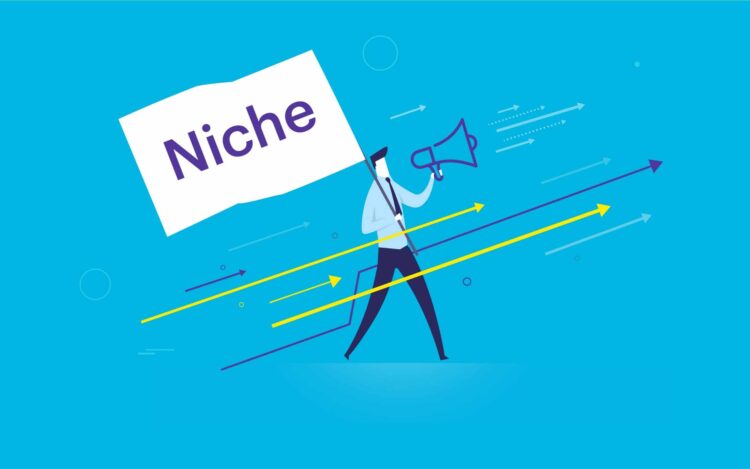
The transition from blog to online business is a journey of a thousand miles, since there are 600 million registered blogs on the world wide web. Needless to say, competition is fierce for bloggers. But a handful of smart, diligent and lucky content creators have the chance to build themselves an online presence or even a blogging empire in their niche. How do they do it?

The Challenges of Starting Blog
As mentioned, there are millions of blogs with millions more created every month and even more articles coming to life on a daily basis. It’s impossible to wrap your head around the fact the abundance of information on the internet is just too overwhelming.
The market for bloggers is extremely saturated since it provides an ability to build passive wealth for months, years, even a lifetime. The internet is a literal goldmine for knowledge and those who share it. This is why millions will flock at the opportunity to push out as much content as possible. Every aspiring content creator is fighting for the same end goal at first, to try and eke out a living from their website.
Another challenging factor would be network. Several bloggers in specific niches have the network to exchange links, knowledge, guest articles and follow up on their digital PR routine.For new bloggers, it’s like competing in the lion’s den with the biggest experts with the network and strong site authority.
Finding the right keywords to avoid competition and putting in the extra work is one of the many ways to outgrow a blog and turn it into a full-time career.

Growing a Website from Scratch
The key to growing a website is through finding trustworthy, informative and user optimized content. Search engine optimization is a process for improving someone’s website to increase its visibility when people search for specific information.
Most first time bloggers opt to create a website through WordPress an open source CMS that is free and easy to use.

Finding your Niche
As mentioned above, the market is saturated with millions of sites. How many specifically? There are 7.5 million new blogs published each day, with WordPress users alone publishing around 70 million posts every single month. This means that narrowing down your niche for your target audience is crucial to keep recurring visitors. But is a narrow niche the only thing to watch out for?
Absolutely not!
When building a blog, the entire website needs to be iconic in some form that one can describe easily in a few words. When looking at other major blogs like Neil Patel, we immediately know its about SEO. If you look at a blog like Travels of Adam, you immediately understand what the website is about. This is the same level of nicheness one needs to achieve.

Becoming a Voice in your Field
When pursuing a specific niche that you’re interested in, it is crucial to be an expert. Providing informative content above all else is the first step before pushing out any conventional or promotional articles.
Once a random website browser sees your site and understands what its about, you can achieve the first step of a marketing funnel. The long term goal is to keep people coming back and that is through giving them value through information. Becoming an expert voice in your field just does that.
Building Different Income Streams
Many common blogs like robertkormoczi.com pursue different types of income streams to diversify a site’s wealth building, should one fail or another work out better. Google ads, banner displays, affiliate marketing or paid links are some of the most popular starters for most first time bloggers who’ve managed to build a small traffic, subscriber or loyal followers.
The greatest difficulty is actually starting out building traffic from scratch from a low domain, strengthening the site through page authority without any backlinks. For this to happen one needs to invest time and money in digital PR and start networking with niche sites that deliver high value. This helps generate traffic and eventually the right leads who’d be happy to purchase books, online courses or merchandise from your site.
eCommerce is a big part of blogging and a major source of income for millions of bloggers who try to eke out a living. Many sites try to sell unique products or online services like consultancy, web design, or content writing. Alternatively, most bloggers want to focus on blogging and don’t have their own unique products, so they try dropshipping where they sell a specific product through a third party vendor or an online design platform like Printify.
Dropshipping in this sense works similar to affiliate programs, where a blogger can get a certain portion of the final sales price.

Blogging like a Business
Most top bloggers aren’t really working as bloggers themselves. They start out as a blogger, and work their way up as CEO’s of their sites that require multiple skills to keep the site live and profitable. As a website grows in traffic and revenue, the site owner has to maintain a business strategy.
Normally high authority websites require a PR specialist, a content writer and in some cases an affiliate specialist and a web developer. A single blogger with hundreds of thousands of monthly organic traffic can hardly keep up with the growth. This is why they need to hire freelancers to help, otherwise the site will either stagnate or leave a site owner burned out. After all, the purpose of most blogs is to help avoid that.
Conclusion
Becoming a full-time business from a blog takes years of dedication and hard work. But the rewards can bring financial freedom and internet fame in an industry. The journey to becoming a full-time blogger is arduous since millions of people are trying to bring their content at the forefront of search engines.
This is why it is useful for bloggers to work together and collaborate through various marketing efforts like content, PR and online expansion. Blogging by itself is not meant to be simple and easy as competition is so fierce. Starting out with a blogging community can help alleviate the barriers of growing a small site into an actual online business that can help provide passive income.











